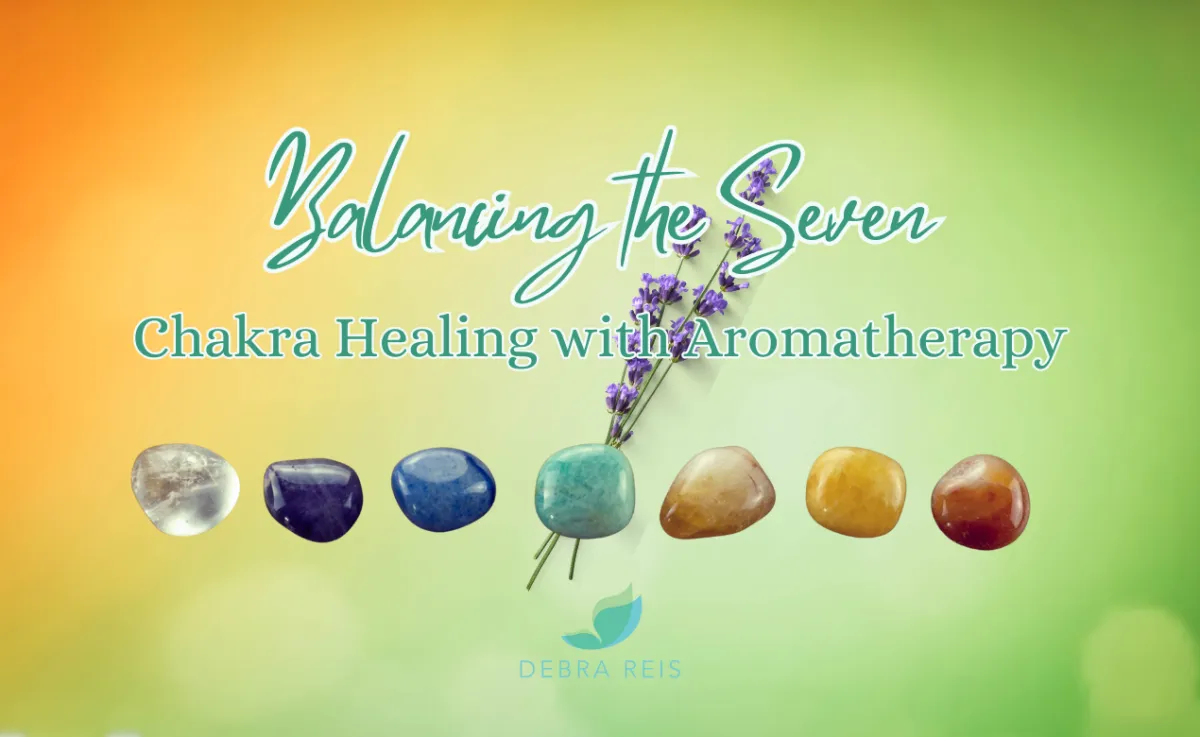BLOG
Supportive Therapies For Better Outcomes — Enrich Your Life Through Relaxation Techniques, Aromatherapy, and Gentle Movement.

Balancing the Seven
In energy medicine, aromatherapy can gently clear energetic blockages and invite flow. When paired with the ancient wisdom of the chakra system, essential oils act like vibrational bridges, subtle supports that nudge the body, mind, and spirit back toward balance. Whether you’re a healer, holistic practitioner, or simply seeking steadier inner calm, these simple practices can help you realign with intention.
What Are Chakras?

Chakra (Sanskrit for “wheel of light”) describes seven primary energy centers that correspond to physical, emotional, and spiritual functions. Imbalances may show up as fatigue, anxiety, digestive complaints, grief, throat tightness, headaches, or spiritual disconnection. The goal is flow, not perfection, so we use gentle inputs (breath, intention, and aroma) to encourage harmony.
The Chakra–Aromatherapy Connection
Essential oils carry distinct energetic signatures. With mindful selection and safe use, they can resonate with a chakra’s frequency and support a shift.
1) Root — Grounding & Safety
Location/Color: base of spine • Red
Signs of imbalance: fear, survival stress, feeling off balance
Supportive oils:
Vetiver (Vetiveria zizanioides) — deeply grounding
Cedarwood (Cedrus atlantica / Juniperus virginiana) — inner strength
Patchouli (Pogostemon cablin) — earthy restoration
Practice: Diffuse briefly or *dilute 1–2% and massage a tiny amount into the soles of the feet before a stressful day.
2) Sacral — Creativity & Flow
Location/Color: lower abdomen • Orange
Signs of imbalance: guilt, stagnation, intimacy blocks
Supportive Oils:
Sweet Orange (Citrus sinensis) - relaxation and creativity
Ylang Ylang (Cananga odorata) - balance and peace
Clary Sage (Salvia sclarea) - connection
Practice: A few drops in massage oil over the lower abdomen (*1–2% dilution) or inhale on a tissue to spark playfulness and ease.
3) Solar Plexus — Confidence & Digestion
Location/Color: upper abdomen • Yellow
Signs of imbalance: low self-esteem, anger, digestive upset
Supportive Oils:
Lemon (Citrus limon) - uplift and clear
Ginger (Zingiber officinale) - comfort and balance
Peppermint (Mentha × piperita) - cool and refreshing
Practice: Inhale Lemon or Ginger on a tissue before a tough conversation. (Peppermint can be stimulating, avoid if reflux is an issue.)
4) Heart — Love & Compassion
Location/Color: center chest • Green
Signs of imbalance: grief, guardedness, immune concerns
Supportive Oils:
Rose (Rosa damascena) - love and joy
Lavender (Lavandula angustifolia) - relaxation and calm
Geranium (Pelargonium graveolens) - comfort and peace
Practice: *Dilute 1% in carrier oil and anoint over the heart during meditation or moments of grief.
5) Throat — Truth & Expression
Location/Color: base of neck • Blue
Signs of imbalance: throat tightness, “can’t find my words”
Supportive Oils:
Spearmint (Mentha spicata) - balance and support
Eucalyptus (Eucalyptus globulus) - strengthen voice
Roman Chamomile (Chamaemelum nobile) - connect with peace
Practice: Inhale gently before journaling or speaking; invite clear, kind expression.
6) Brow/Third Eye — Insight & Intuition
Location/Color: between eyebrows • Indigo
Signs of imbalance: headaches, fog, indecision
Supportive Oils:
Frankincense (Boswellia carterii / B. sacra) - direction and focus
Cedarwood (Cedrus atlantica) - grounding and inner strength
Rosemary (Rosmarinus officinalis) - clarity and connection
Practice: Diffuse briefly during morning meditation or evening reflection.
7) Crown — Spirit & Wisdom
Location/Color: top of head • Violet/White
Signs of imbalance: spiritual fatigue, disconnection
Supportive Oils:
Frankincense - spirtually uplifting
Lavender - peace and connection
Myrrh (Commiphora myrrha) - calming and inner peace
Practice: Diffuse (short, intermittent) during prayer or study to elevate and soften.
*Dilution for topical: 1–2% on intact skin only (≈ 6–12 drops per 1 oz/30 mL carrier).
Carrier oils include - jojoba, coconut, almond, grapeseed, and more.
A 3-Step, 2-Minute Chakra Tune-In

Intention: Choose a word (e.g., grounded, clear, open).
Aroma: 1 drop on a tissue that matches your focus (e.g., Vetiver for Root, Lavender for Heart).
Breath: Inhale 4—hold 2—exhale 6 (×3). Notice any softening or shift.
Bringing It Together
Chakra healing is about flow, balance, and connection to your inner truth. When used wisely and with intention, aromatherapy offers a gentle bridge back to your center, one breath, one drop, one moment at a time.


Balancing the Seven
In energy medicine, aromatherapy can gently clear energetic blockages and invite flow. When paired with the ancient wisdom of the chakra system, essential oils act like vibrational bridges, subtle supports that nudge the body, mind, and spirit back toward balance. Whether you’re a healer, holistic practitioner, or simply seeking steadier inner calm, these simple practices can help you realign with intention.
What Are Chakras?

Chakra (Sanskrit for “wheel of light”) describes seven primary energy centers that correspond to physical, emotional, and spiritual functions. Imbalances may show up as fatigue, anxiety, digestive complaints, grief, throat tightness, headaches, or spiritual disconnection. The goal is flow, not perfection, so we use gentle inputs (breath, intention, and aroma) to encourage harmony.
The Chakra–Aromatherapy Connection
Essential oils carry distinct energetic signatures. With mindful selection and safe use, they can resonate with a chakra’s frequency and support a shift.
1) Root — Grounding & Safety
Location/Color: base of spine • Red
Signs of imbalance: fear, survival stress, feeling off balance
Supportive oils:
Vetiver (Vetiveria zizanioides) — deeply grounding
Cedarwood (Cedrus atlantica / Juniperus virginiana) — inner strength
Patchouli (Pogostemon cablin) — earthy restoration
Practice: Diffuse briefly or *dilute 1–2% and massage a tiny amount into the soles of the feet before a stressful day.
2) Sacral — Creativity & Flow
Location/Color: lower abdomen • Orange
Signs of imbalance: guilt, stagnation, intimacy blocks
Supportive Oils:
Sweet Orange (Citrus sinensis) - relaxation and creativity
Ylang Ylang (Cananga odorata) - balance and peace
Clary Sage (Salvia sclarea) - connection
Practice: A few drops in massage oil over the lower abdomen (*1–2% dilution) or inhale on a tissue to spark playfulness and ease.
3) Solar Plexus — Confidence & Digestion
Location/Color: upper abdomen • Yellow
Signs of imbalance: low self-esteem, anger, digestive upset
Supportive Oils:
Lemon (Citrus limon) - uplift and clear
Ginger (Zingiber officinale) - comfort and balance
Peppermint (Mentha × piperita) - cool and refreshing
Practice: Inhale Lemon or Ginger on a tissue before a tough conversation. (Peppermint can be stimulating, avoid if reflux is an issue.)
4) Heart — Love & Compassion
Location/Color: center chest • Green
Signs of imbalance: grief, guardedness, immune concerns
Supportive Oils:
Rose (Rosa damascena) - love and joy
Lavender (Lavandula angustifolia) - relaxation and calm
Geranium (Pelargonium graveolens) - comfort and peace
Practice: *Dilute 1% in carrier oil and anoint over the heart during meditation or moments of grief.
5) Throat — Truth & Expression
Location/Color: base of neck • Blue
Signs of imbalance: throat tightness, “can’t find my words”
Supportive Oils:
Spearmint (Mentha spicata) - balance and support
Eucalyptus (Eucalyptus globulus) - strengthen voice
Roman Chamomile (Chamaemelum nobile) - connect with peace
Practice: Inhale gently before journaling or speaking; invite clear, kind expression.
6) Brow/Third Eye — Insight & Intuition
Location/Color: between eyebrows • Indigo
Signs of imbalance: headaches, fog, indecision
Supportive Oils:
Frankincense (Boswellia carterii / B. sacra) - direction and focus
Cedarwood (Cedrus atlantica) - grounding and inner strength
Rosemary (Rosmarinus officinalis) - clarity and connection
Practice: Diffuse briefly during morning meditation or evening reflection.
7) Crown — Spirit & Wisdom
Location/Color: top of head • Violet/White
Signs of imbalance: spiritual fatigue, disconnection
Supportive Oils:
Frankincense - spirtually uplifting
Lavender - peace and connection
Myrrh (Commiphora myrrha) - calming and inner peace
Practice: Diffuse (short, intermittent) during prayer or study to elevate and soften.
*Dilution for topical: 1–2% on intact skin only (≈ 6–12 drops per 1 oz/30 mL carrier).
Carrier oils include - jojoba, coconut, almond, grapeseed, and more.
A 3-Step, 2-Minute Chakra Tune-In

Intention: Choose a word (e.g., grounded, clear, open).
Aroma: 1 drop on a tissue that matches your focus (e.g., Vetiver for Root, Lavender for Heart).
Breath: Inhale 4—hold 2—exhale 6 (×3). Notice any softening or shift.
Bringing It Together
Chakra healing is about flow, balance, and connection to your inner truth. When used wisely and with intention, aromatherapy offers a gentle bridge back to your center, one breath, one drop, one moment at a time.




